Insights < BACK TO ALL INSIGHTS
Caught Red Handed, But What is Pete Rose’s Crime?
Caught Red Handed, But What is Pete Rose’s Crime?
By: James Trusty
What exactly is the hustle that has kept Pete Rose from safely sliding into the Baseball Hall of Fame? Recently released FBI files from the late 1980’s put little flesh on the skeleton in Rose’s closet, but plenty of normative questions remain about Rose’s now posthumous candidacy.
The FBI reports lay out how a local bar in Franklin, Ohio, called Jonathan’s, was reportedly a front for selling large quantities of cocaine in Franklin and Miamisburg. The owner, Ronald Peters, was also noted to be a major bookmaker, and the Franklin local police frequently saw Pete Rose entering the bar through a private entrance. A cooperating defendant advised that Rose once ran up a $90,000 tab with Peters on lost wagers. Unfortunately, the Franklin Police Department was described as “refusing to act on this information,” and as regularly hanging out at the bar, so the FBI viewed its involvement in investigating drugs and gambling as justified by local inaction.
The 132 pages of FBI documentation fall short of explaining the full scope and results of the investigation. Their playbook appears pretty typical: agents interviewed informants and cooperating defendants, obtained phone records to identify participants, surveilled Peters and tried to wire up informants for purchases of cocaine. But other than a few references to Rose hanging out at Jonathan’s and betting on sports other than baseball, the document dump hardly convicts Rose of anything other than keeping bad company. The investigation seemed to be building up information that might support a wiretap before the paper trail runs completely cold.
Interestingly, about one year later, in 1989, Peters pleaded guilty, cooperated at Rose’s apparent expense, and went to prison for two years on cocaine and tax charges. His story to authorities undoubtedly included Rose betting on baseball, because Rose himself admitted as much when he agreed to his lifetime ban from baseball. Peters later did stints in jail for theft and failing to pay child support. In 2004, he survived being shot in the head in a Dayton parking lot, and in 2016 he was found dead in his Franklin, Ohio apartment. Authorities quickly announced that “no foul play was suspected,” but the awaited toxicology results never seemed to make their way into the local reporting. Drug dealing and sports betting never seemed to elevate Peters away from a bumpy life almost exclusively centered around Franklin.
Rose, on the other hand, has been a frequent point of discussion regarding players and managers engaging in gambling. Just as unexpected deaths of young rock stars tend to boost record sales dramatically, Pete Rose’s chances of getting into the Hall may have naturally gone up since his death last September. The question of his eligibility is in many ways a moral one and also a psychic one: did Rose’s gambling habits forever destroy his significant contribution to the MLB record books, and what exactly is the thought process behind each baseball writer[1] who votes on Rose? If a criminal conviction was the disqualifying standard, Rose would have long ago entered the Hall. But the issue instead boils down to the amorphous category of “integrity.” One of the most fascinating aspects of the coming vote is that Rose likely will be teamed up with Shoeless Joe Jackson, of the infamous 1919 Chicago “Black Sox” scandal.[2] Will the contrast between Rose (betting on the Reds to win every game) and Jackson (throwing a World Series) allow the BBWAA voters to forgive Rose’s over-enthusiasm, viewing it as substantially less damaging than financially benefitting from lost games?
With the advent of state-owned lotteries, highly profitable (and highly regulated) sports books across 40 states, and omnipresent fantasy sport contests, anti-gambling moralism has generally faded over time. Gambling that secretly dictated poor performance remains an obvious sin, but Rose’s combining of gambling enthusiasm—or even addiction—with optimistic belief in his Reds winning every night seems a bit less objectionable. The list of those permanently banned from the Hall includes mostly bribers,[3] juicers, and players who throw games, so in some ways Rose looks considerably less problematic to the game’s integrity. It is hard for major league sports leagues to blast players for gambling or “consorting” with gambling types when every commercial during most sporting events now is about gambling. The leagues consort with fantasy and gambling platforms more freely than any player does.
Peter Rose, aka “Charlie Hustle,” was an intense and competitive player and manager, and one who could rub people the wrong way. His betting scandal appropriately made headlines at the time, but in several ways, it is receding with time and due to comparisons to the conduct of others whose corruption altered, or could have altered, games in a direct way. He was no angel, but with changing social morays and a fair comparison to the acts of other banned candidates, by Christmas of 2027 Pete Rose may be a safe bet for induction.
[1] Members of the Baseball Writers Association of America (BBWAA). For Rose, it appears that it would be the “Classic Baseball Era Committee” that would have authority to vote on Rose, beginning in December of 2027.
[2] https://www.espn.com/mlb/story/_/id/45131171/mlb-2025-lift-ban-manfred-pete-rose-joe-jackson-hall-fame
[3] The team physician for baseball’s New York Giants was banned in 1908 after trying to bribe an umpire with $2,500 to help defeat the Cubs in a playoff game. The Philadelphia Phillies owner was banned in 1912 for publicly claiming the umpires were favoring the Giants. If that moral basis was still upheld today, imagine how many NFL players and owners would be in trouble for Kansas City Chief/referee jokes in recent years!





